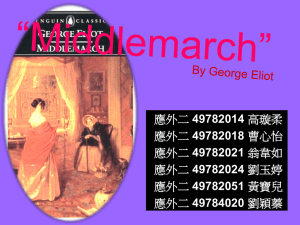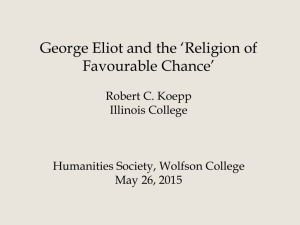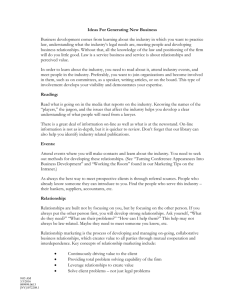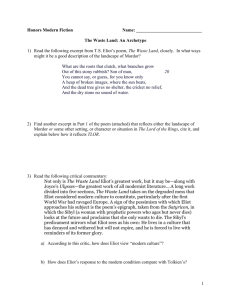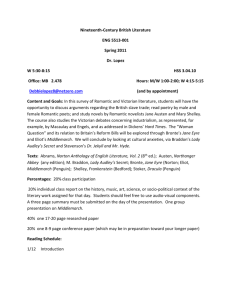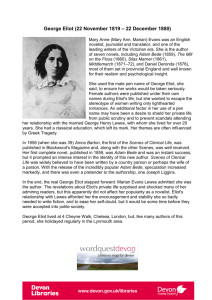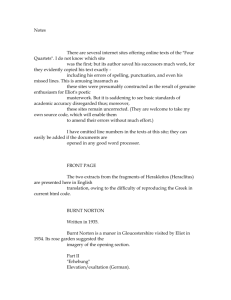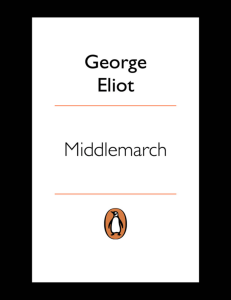MIDDLEMARCH
advertisement
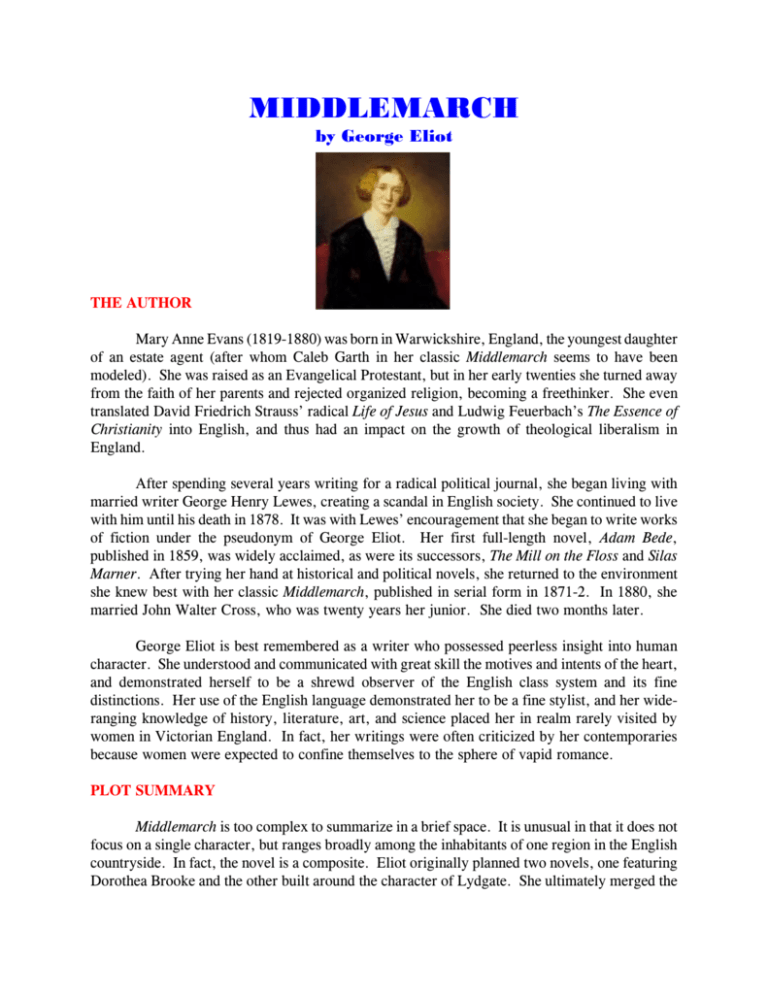
MIDDLEMARCH by George Eliot THE AUTHOR Mary Anne Evans (1819-1880) was born in Warwickshire, England, the youngest daughter of an estate agent (after whom Caleb Garth in her classic Middlemarch seems to have been modeled). She was raised as an Evangelical Protestant, but in her early twenties she turned away from the faith of her parents and rejected organized religion, becoming a freethinker. She even translated David Friedrich Strauss’ radical Life of Jesus and Ludwig Feuerbach’s The Essence of Christianity into English, and thus had an impact on the growth of theological liberalism in England. After spending several years writing for a radical political journal, she began living with married writer George Henry Lewes, creating a scandal in English society. She continued to live with him until his death in 1878. It was with Lewes’ encouragement that she began to write works of fiction under the pseudonym of George Eliot. Her first full-length novel, Adam Bede, published in 1859, was widely acclaimed, as were its successors, The Mill on the Floss and Silas Marner. After trying her hand at historical and political novels, she returned to the environment she knew best with her classic Middlemarch, published in serial form in 1871-2. In 1880, she married John Walter Cross, who was twenty years her junior. She died two months later. George Eliot is best remembered as a writer who possessed peerless insight into human character. She understood and communicated with great skill the motives and intents of the heart, and demonstrated herself to be a shrewd observer of the English class system and its fine distinctions. Her use of the English language demonstrated her to be a fine stylist, and her wideranging knowledge of history, literature, art, and science placed her in realm rarely visited by women in Victorian England. In fact, her writings were often criticized by her contemporaries because women were expected to confine themselves to the sphere of vapid romance. PLOT SUMMARY Middlemarch is too complex to summarize in a brief space. It is unusual in that it does not focus on a single character, but ranges broadly among the inhabitants of one region in the English countryside. In fact, the novel is a composite. Eliot originally planned two novels, one featuring Dorothea Brooke and the other built around the character of Lydgate. She ultimately merged the two into one, and in the process built an intricate story of community interrelationships, detailed to some extent in the character list below. I will attempt no more here than to summarize the major plot lines of the novel. The first concerns Dorothea Brooke, an idealistic and pious young woman who is in many ways a surrogate for the author. She seeks to achieve great goodness in her life, and believes that this may best be accomplished by submitting herself to a great man in order to help him achieve his goals in life. Unfortunately, she chooses Casaubon, a clergyman thirty years her senior, and a hopelessly inept scholar who has begun a massive project that he is too insecure to commit to writing, let alone finish. Because she thinks of him as a great soul and he expects from her little more than total submission to his desires (which are not at all of the flesh), their marriage is in trouble from the start. While on their honeymoon, Dorothea meets and is attracted to Will Ladislaw, a second cousin of Casaubon. She maintains complete fidelity to her husband, but Casaubon quickly becomes jealous when he senses an attraction between the young people. Within a few years after their return to England, Casaubon dies of a heart attack, but in his will disinherits Dorothea should she marry Ladislaw. Ladislaw leaves Middlemarch for London, and Dorothea takes steps to use her wealth for the good of the community. She continues to plan housing for the workers on the local estates, and supports Lydgate in his medical endeavors. Eventually, she and Will marry, and they go off to London, where he becomes involved in politics. Dorothea never does find her “great soul” to support. The second major plot line involves Lydgate, a young physician who comes to Middlemarch in order to try out his new medical theories for treating fever. He enjoys some early success, but his lack of social skills causes him to alienate the other doctors in town, as he had already alienated his own rich relatives, who objected to his pursuit of medicine. While treating Fred Vincy, he flirts with his sister Rosamond, whom he eventually marries. Again, the marriage is not a happy one because the two enter it with unrealistic expectations. Lydgate expects Rosamond to be a trophy wife - to look beautiful and do little else. Meanwhile, she, having been pampered in the Vincy household, knows nothing of money except that it will be provided by the men around her whenever she needs it, and expects to enjoy a life of high society befitting the wealth that she thinks Lydgate’s family possesses. In short order, she runs him into nearbankruptcy, and becomes unhappy and manipulative. He, on the other hand, realizes that he needs his wife’s help if he is to survive in the world - she must be more than a trophy; she must also be a partner. Their marriage almost founders over the bankruptcy issue, Rosamond’s miscarriage resulting from a foolish outing on horseback while pregnant, and Lydgate’s involvement with Bulstrode, whose failure nearly brings Lydgate down as well. In the process, Lydgate’s reputation is damaged so badly that he must leave for London, where he dies at a relatively young age, never having accomplished his medical ambitions. Smaller subplots involve the romance of Fred Vincy and Mary Garth and the fiscal irresponsibility on Fred’s part that nearly destroys their relationship before it starts, along with the downfall of the banker Bulstrode, whose shady past comes back to haunt him in a way that destroys his reputation in the community. Again, the character summaries below fill in some of the details about these subplots. MAJOR CHARACTERS • Dorothea Brooke (Casaubon, later Ladislaw) - An idealist and sincerely religious woman, Dorothea wants to make the world a better place, initially by planning houses for the poor in the district, and later by serving a great man by means of marriage. Her marriage to Casaubon is a disaster, but she is able to improve housing conditions for the poor and assist Lydgate financially in his medical work. Her early Evangelical religion ultimately fades into a vague mysticism; it is no accident that she is compared by the author, in both the Prologue and the Finale, to Saint Theresa of Avila. She ultimately marries Ladislaw after Casaubon’s death despite the fact that it costs her the inheritance she had received from her first husband. • Arthur Brooke - Dorothea’s bachelor uncle, he is a bumbler who is incapable of taking a stand on anything. He enters politics as a reformer, but is unwilling to reform the condition of his own estate until forced by public pressure to do so. He hires Ladislaw to run his campaign despite the fact that he really understands little of the latter’s political opinions. • Celia Brooke (Chettam) - Dorothea’s sister, she marries Sir James Chettam and settles down as part of the country aristocracy. • Sir James Chettam - After having initially wooed Dorothea, he marries Celia after the former rejects him in favor of Casaubon. He does, however, put Dorothea’s plans for housing for estate laborers into practice on his own lands. • Edward Casaubon - A scholarly clergyman who has inherited the large estate of Lowick, he sees in Dorothea the submissive wife he desires, and she sees in him the great soul she longs to support. Both are wrong in their perceptions, of course, and their marriage is miserable. He supports Will Ladislaw, his second cousin, out of a sense of family obligation, but later becomes jealous of him and takes steps to insure that Dorothea will not marry him after his own death. His magnum opus, The Key to All Mythologies, which seeks a unified explanation for all the world’s religions, never gets beyond the note-taking stage. • Will Ladislaw - The grandson of Casaubon’s aunt, whose mother was disinherited by the family for marring a Polish immigrant. Casaubon’s aunt was also Bulstrode’s first wife; he hid from her the existence of her disinherited daughter and her young son, and claimed her entire estate after her death. Ladislaw is a political radical who cares little for money, and would prefer to spend his time among artists and reformers. He meets Dorothea while she and Casaubon are on their honeymoon in Italy, and falls in love. He returns to Middlemarch to become the editor of a periodical championing the reforming political movement (and advancing Brooke’s candidacy), but leaves after Casaubon’s death when he realizes his presence is an embarrassment to Dorothea. When Bulstrode’s dirty secret is revealed, he offers Will money, which he refuses. Ultimately, he and Dorothea marry, and they move to London, where he involves himself in the world of politics. • Tertius Lydgate - A young orphan who shocks his aristocratic relatives by entering the medial profession, he moves to Middlemarch to find an outlet for his new medical theories. He initially receives financial support from the banker Bulstrode, though in order to get it he must support Bulstrode’s candidate, the Evangelical preacher Tyke, for the chaplaincy of the new hospital. While caring for Fred Vincy, he flirts with and ultimately marries Rosamond Vincy. Their marriage is also an unhappy one, largely because of the preconceptions with which each enters the marital state. Rosamond drives him to the brink of bankruptcy, and a loan from Bulstrode embroils him in the latter’s scandal, especially because of its temporal proximity to the suspicious and altogether too convenient death of Raffles, who was under Lydgate’s treatment. Dorothea rescues him from his association with Bulstrode, but his practice is ruined, and he and his wife go to London, where he dies young without ever having a good opportunity to put his theories into practice. • Camden Farebrother - A local clergyman who considers himself unsuited to the profession, he is liked by all as an easygoing vicar, but is forced by financial pressures to support himself and his female relatives by gambling. Lydgate denies him the chaplaincy of the hospital under pressure from Bulstrode, but the two later become friends, and he rescues Lydgate from his own bout with gambling. Eventually Dorothea appoints him as pastor of Lowick parish after the death of Casaubon. • Walter Tyke - The strict and stuffy Evangelical minister who, through Bulstrode’s influence, becomes the chaplain of the New Hospital. • Rosamond Vincy (Lydgate) - A beautiful and spoiled young lady who expects that luxury is her rightful lot in life, she nearly drives Lydgate into bankruptcy after their marriage, then becomes bitter and manipulative when he is unable to support her in the lifestyle to which she is accustomed. Her miscarriage while riding recklessly on horseback almost destroyed the marriage. • Nicholas Bulstrode - A wealthy Middlemarch banker and strict Methodist, he is married to Harriet Vincy, who is his second wife. His fortune was dishonestly obtained, first through running a pawnbroker’s establishment, then through obtaining his first wife’s money by hiding from her the continued existence of her disinherited daughter and grandson. Bulstrode bribed John Raffles, the man hired to find the missing heirs, to remain quiet about his discovery. Raffles later comes to Middlemarch and tries to blackmail Bulstrode with this information. Bulstrode foolishly pays him, then cares for him when he becomes ill. Raffles dies under suspicious circumstances when Bulstrode ignores Lydgate’s medical advice, directly leading to the convenient demise of the blackmailer. The scandal comes out anyway, and Bulstrode is forced to leave Middlemarch in disgrace. • Harriet (Vincy) Bulstrode - Bulstrode’s wife and Walter Vincy’s sister, she stands by her husband in his disgrace. • John Raffles - A disreputable character who takes Bulstrode’s initial bribe, then seeks more money by holding his knowledge of the scandal over Bulworth’s head. A hopeless drunkard, he dies at Bulstrode’s estate when the latter ignores Lydgate’s medical instructions. • Fred Vincy - Walter Vincy’s son, a confirmed layabout with no ambition beyond the desire to inherit money so he can live a life of pleasure and never have to work. His carelessness with money gets him deeply into debt to his friend Caleb Garth, and nearly ruins his chance to marry his beloved Mary. His father wants him to become a clergyman, but he has no desire to do so, and Mary refuses to marry him if he pursues a career in that direction. Instead, he goes to work under Caleb Garth, and makes a respectable career for himself, finally marrying Mary with the help of Camden Farebrother’s intercession. • Peter Featherstone - An unpleasant but wealthy old man, he hints that he will leave his estate to Fred, his nephew, and manipulates him for years by means of this stratagem. Ultimately, however, he leaves his money to his illegitimate son, Joshua Rigg. Mary Garth serves as his housekeeper during his declining years. • Caleb Garth - An honest and hard-working estate manager, his family suffers hen he cosigns a debt for Fred that the latter is unable to pay. He nonetheless helps Fred to learn a trade. His moral standards are such that he refuses lucrative employment from Bulstrode after the latter’s shady past is revealed. • Mary Garth - Caleb’s daughter, she refuses to marry Fred unless he finds steady work and shuns a clerical career. Camden Farebrother is also in love with her, but sublimates his own feelings in order to intercede with her on Fred’s behalf. • Walter Vincy - A successful businessman and mayor of Middlemarch, he is Fred and Rosamond’s father. Their expensive ways infuriate him, and he refuses to lend Lydgate money after Rosamond’s spending gets them into financial trouble. NOTABLE QUOTATIONS “Many Theresas have been born who found for themselves no epic life wherein there was a constant unfolding of far-resonant action; perhaps only a life of mistakes, the offspring of a certain spiritual grandeur ill-matched with the meanness of opportunity; perhaps a tragic failure which found no sacred poet and sank unwept into oblivion. With dim lights and tangled circumstance they tried to shape their thought and deed in noble agreement; but after all, to common eyes their struggles seemed mere inconsistency and formlessness; for these later-born Theresas were helped by no coherent social faith and order which could perform the function of knowledge for the ardently willing soul.... Here and there a cygnet is reared uneasily among the ducklings in the brown pond, and never finds the living stream in fellowship with its own oaryfooted kind. Here and there is born a Saint Theresa, foundress of nothing, whose loving heartbeats and sobs after an unattained goodness tremble off and are dispersed among hindrances, instead of centering in some long-recognizable deed.” (Prologue) “Her finely-touched spirit had still its fine issues, though they were not widely visible. Her full nature, like that river of which Cyrus broke the strength, spent itself in channels which had no great name on the earth. But the effect of her being on those around her was incalculably diffusive: for the growing good of the world is partly dependent on unhistoric acts; and that things are not so ill with you and me as they might have been, is half owing to the number who lived faithfully a hidden life, and rest in unvisited tombs.” (Finale) ESSAY QUESTIONS Discuss the following in a five-paragraph essay: 1. Some critics of George Eliot’s Middlemarch have argued that the characters in the story represent types rather than recognizable people. For instance, they see in Dorothea the stereotypical mystic, in Casaubon the stereotypical Rationalist, and in Will Ladislaw the epitome of the Romantic. Do you agree with this assertion? Why or why not? 2. In George Eliot’s Middlemarch, the troubled marriages of the Casaubons and the Lydgates are to some extent due to idealistic views of marriage and the “perfect spouse” entertained by the four participants prior to their marriages. What are the respective misapprehensions that Dorothea. Casaubon, Rosamond, and Lydgate bring with them into their marriages, and how do these misapprehensions serve to subvert their marital relationships? 3. In George Eliot’s Middlemarch, the author’s portrayal of a variety of characters incorporates her implied evaluations of the variety of religious ideas prevalent in England in the Victorian era. By making reference to specific characters and specific situations, assess the religious opinions of the author of Middlemarch. 4. In many ways, the most dangerous deceptions practiced upon us are the ones we perpetrate upon ourselves. Self-deception can be both destructive and long-lasting. Choose one character in George Eliot’s Middlemarch and show how this character’s life is damaged by self-deception. 5. England in the 1830's was a place of rapid and often discomfiting change. The Industrial Revolution was in full swing, and political forces were gathering that would eventually produce the great Reform Bill of 1832, which completely reorganized the districts from which members of Parliament were elected, and the social reforms passed by the newlyreorganized Parliament in the twenty years that followed. Aristocracy was losing its place and its power to the growing industrial middle class. In George Eliot’s Middlemarch, Lydgate is the primary symbol of these political changes. How does he serve to portray the spirit of the age, and what do the responses of the other characters to him tell us about the ways in which English society dealt with the uncertainties with which the path of history presented it? 6. George Eliot’s Middlemarch was written by a woman who, by her very approach to writing, defied the conventions of the society in which she lived. How does her disdain for the role to which women were restricted in Victorian England appear in the female characters she creates? 7. Both Bulstrode in Middlemarch and Wickham in Pride and Prejudice offend the moral standards of the society in which they live. Whose offense is the more serious in your opinion? Which man is punished more severely by the society in which he lives? Why do you think this is the case? 8. Both Rosamond in Middlemarch and Lydia in Pride and Prejudice are consummately selfish women, though the nature of their self-centeredness differs significantly. Both marry young, and face long years ahead with an unsuitable mate. Which of the two do you think would be more likely to overcome her selfishness and lead a productive life? Why do you think so? 9. In what ways does the character of Caleb Garth in George Eliot’s Middlemarch personify the Victorian attitude toward work and its moral and social benefits? 10. George Eliot has been said by some critics to be an author whose works focus on Fate and its role in the lives of ordinary people. Using examples from Middlemarch, support this assertion by showing how chance events cause “the best laid plans of mice and men” to go awry. 11. George Eliot’s Middlemarch is an unusual novel in that it does not focus on a single protagonist. It is, in fact, a conflation of two distinct novels, one featuring Dorothea and the other concentrating on Lydgate. Because the book is subtitled A Study of Provincial Life, some have argued that the lack of focus on a single main character adds to its realism and ability to present the life of a community, with its many interrelationships, effectively. Evaluate Eliot’s strategy. Would the novel have worked better had she focused on a single character, or did the unusual approach she used enable the story to communicate the reality of life in the English countryside more fully? 12. George Eliot’s Middlemarch is an unusual novel in that it does not focus on a single protagonist. It is, in fact, a conflation of two distinct novels, one featuring Dorothea and the other concentrating on Lydgate. Both characters become embroiled in unhappy marriages because they marry in haste, without really taking the time to get to know their prospective spouses. How do you think things might have turned out differently had they married each other rather than chaining themselves to equally unsuitable spouses? 13. Personal tragedy and failure often result when an individual experiences conflict between his ideals and the realities of his life. Choose one character in George Eliot’s Middlemarch, and explain how such a conflict led to unhappiness and failure. How could such a conflict have been avoided in this particular character’s life? 14. Gossip is a sin that is strongly condemned in the Bible. How do the events of George Eliot’s Middlemarch demonstrate the wickedness and cruelty of gossip? Why is gossip such a serious and damaging offense? 15. Quiet acts of courage and dignity, too small and insignificant to be recorded by any historian, can nonetheless have a major impact on the lives of individuals and entire communities. Cite examples from George Eliot’s Middlemarch to support the importance of seemingly unnoticed acts of moral goodness. 16. Jane Austen once described the subjects of her novels as “three or four families in a country village.” The same description in some ways fits the writings of George Eliot, yet the two also differ in the ways in which they utilize such an isolated setting. Compare and contrast the roles of the “country village” setting in Jane Austen’s Pride and Prejudice and George Eliot’s Middlemarch. 17. Mary Anne Evans, the author who used George Eliot as a pen name, was raised in an evangelical Christian family, but rejected the faith with which she grew up, and all organized religion with it. Compare and contrast the attitudes toward evangelicalism evident in The Mill on the Floss and Middlemarch. Use incidents, characters, and quotations from both novels to illustrate why she came to despise the faith in which she had been raised. 18. Compare and contrast the moral transformations undergone by one character from each of George Eliot’s great novels, Middlemarch and Silas Marner. Which transformation was more credible? Which more satisfying to the reader? Why? 19. Both George Eliot’s Silas Marner and Middlemarch are critical of the British class system in general and the aristocracy in particular. Which book, in your opinion, presents a more effective critique? Support your opinion with specific incidents from both books. 20. George Eliot grew up in an evangelical Christian church, but turned away from the faith in which she had been raised when she reached adulthood. Both Silas Marner and Middlemarch present a negative view of evangelical religion, while speaking favorably of the more liberal, tolerant Latitudinarianism that then dominated the Church of England. Based on evidence from the two novels, what was there about the evangelical church that had disillusioned the budding author? Do you think the primary problem lay with the church, or with George Eliot herself? Why? 21. Compare and contrast the reforming doctors, John Bold and Tertius Lydgate, in Anthony Trollope’s The Warden and George Eliot’s Middlemarch. Include in your assessment their status in the community, their reforming ideas, and their roles in the plots of the two novels. 22. Marian Halcombe, the central female character in Wilkie Collins’ The Woman in White, is believed to have been based on Mary Anne Evans, better known as George Eliot, a strong woman who was also, as Collins says of his protagonist, remarkably ugly. Compare and contrast Marian with Eliot’s most autobiographical heroine, Dorothea Brooke in Middlemarch. What qualities do the two have in common? In what important ways do they differ? Be sure to use specifics from both novels in answering the question.
